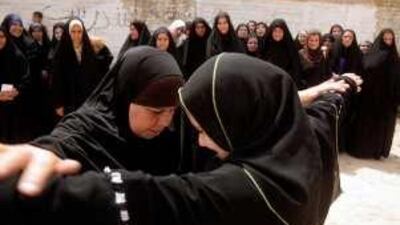The Daughters of Iraq, a group set up to counter the rise in suicide bombings by women last year, says its achievements may be undone if the government decides to reduce its numbers because of a lack of funds. BAGHDAD // The leader of a women's group set up to prevent female suicide bombers in Iraq has warned against plans to cut back the programme. Wjdan Adel, who heads the Daughters of Iraq probramme in Diyala province, said reduced budgets and recruitment could lead to a breakdown in security and help Islamic extremists revive a network of female militants.
"The interior ministry has said it wants to end its contract with 150 members of the Iraqi Daughters programme," she said. "If that happens the security situation in Diyala province will worsen. "It is far too early to say that this problem [of female suicide bombers] is over, just because the situation is beginning to settle down. It will take at least two more years before we are able to say that the problem has been solved."
About 400 women in Diyala province have been recruited as part of the Daughters of Iraq programme. A response to a growing number of suicide attacks being carried out by women, it was funded by the Iraqi government and supported by the US military, which helped to train women to work as security agents. By 2006, areas of Diyala province, the scene of some of the worst violence since the United States-led invasion, became a stronghold for the Islamic State of Iraq insurgent group. Tens of thousands of refugees fled Diyala - many of them still refuse to return - and countless numbers of people were killed.
As the war progressed, women increasingly became involved as fighters, particularly those who had lost their husbands or families to the violence. With their loved ones dead, they were more vulnerable to recruitment by Islamic militants, styled after al Qa'eda. Women were a particularly prized means of delivering suicide bombs because, under Iraqi traditions, male police officers or soldiers cannot physically search them. Dressed in flowing black gowns, female suicide bombers were often able to get much closer to their target than a man could hope to.
In 2008, female suicide bombers carried out or attempted at least 32 attacks, according to the US military, compared to eight in 2007. There have been a number of such bombings already this year, including one that targeted Shiites in Kerbala, killing 50 people. In August last year the issue of female bombers was thrust into the limelight when Rania Ibrahim, a 15-year-old girl, attempted to blow herself up at a checkpoint near Baquba, the capital of Diyala province. She was spotted by police officers who handcuffed her to a railing before defusing the bomb. The incident was recorded on video and was subsequently shown across the globe.
The teenager was sentenced to seven and a half years in prison this year by a juvenile court. The Iraqi judge rejected claims by US officials that she had been wired with explosives against her will and had voluntarily turned herself in to Iraqi police. "Al Qa'eda was able to recruit many widows and orphans who wanted to take revenge against the US forces and the Iraqi army," said Mrs Adel. "Some of those widows saw what was happening and didn't want to be part of more killing so they decided to do something about it and they established their own security force."
As well as training women to work as conventional police officers, the Daughters of Iraq programme also led to the establishment of a network of female informants across Diyala. "We have intelligence cells working close to al Qa'eda and they have been able to prevent some women from being successful with suicide attacks," Mrs Adel said in an interview. "And we have women in the busy markets and streets who keep a special lookout for possible bombers."
The programme has won the praise of both US and Iraqi security forces. But, as the Iraqi government is struggling to cope with restricted budgets, caused by falling oil prices, various savings are being sought in public sector spending and, according to Mrs Adel, the Daughters of Iraq programme has been earmarked for cutbacks. Manal Jubouri, an activist for women's rights in Diyala city, said the efforts to prevent women's recruitment by Islamic extremists were playing an important role.
"Some women were trapped by cultural, religious, economic and family factors that pushed them in the direction of becoming bombers," she said. "Armed groups were quick to exploit this. "Our campaigns against this culture of jihad has been working, we have been identifying vulnerable women and educating them, and teaching them that destruction is not the answer to anyone's problems." A member of the Daughters of Iraq programme in Diyala, Zahra Zahir al Zobaie, said working with the Iraqi security services was also helping change conservative cultural attitudes about whether or not women should be allowed to work.
"In the beginning there was a very critical reaction against us because we were women out working in this way," she said. "But people have come to see our achievements and the fact that we are protecting the poor and the innocent. They have also seen that we can earn salaries from our work and US$300 [Dh1,100] a month can be important to any poor household. "In this way, we are helping to change general ideas about women and we provide an alternative example to those who have a wrong idea about Islam and who teach women to want to blow themselves up."
nlatif@thenational.ae

